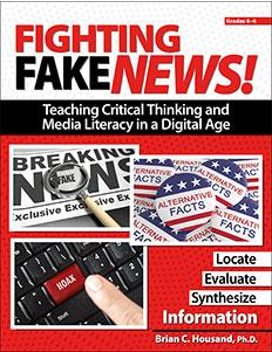Publication Details
| OLOR Series: | ROLE Reviews |
| Author(s): | Remington Jones |
| Original Publication Date: | 15 March 2019 |
| Permalink: |
<gsole.org/olor/reviews/2020vol3no1.rev1> |
Publication Note
This review was originally published in Research in Online Literacy, vol. 3, no. 1 (2020).
Resource Overview
Media, Figures, Tables |
Resource Contents
Review of Fighting Fake News!
Fighting Fake News! Teaching Critical Thinking and Media Literacy in a Digital Age offers pedagogical strategies and techniques for educators who want to ensure their students are well equipped to find and evaluate trustworthy information in the modern world. The author, Dr. Brian Housand, draws on his background in educational psychology and recent developments in information evaluation methodologies to provide a concise, easy-to-read overview of the difficulties at hand and how to approach them.
After a brief overview of “fake news,” including historical context for this “new” issue that is in reality at least as old as the printing press, Dr. Housand introduces the New Literacies framework developed by Dr. Donald Leu and the New Literacies Research Team at the University of Connecticut. This is a set of five proficiencies students need in an online setting: identifying important questions, locating information, critically evaluating information, synthesizing information, and communicating information. The bulk of the book leans on this framework, devoting a chapter to each skill which explains the skill’s purpose and how it works, followed by suggestions for student activities designed to explore and reinforce the concepts. Some of these chapters are straightforward: The “Identifying Important Questions” chapter largely serves as a tutorial on how to most effectively use Google’s search engine, which may be remedial for some readers but eye-opening for others. Other chapters are more in-depth, like “Critically Evaluating Information,” which goes over two existing methodologies—the CRAAP (Currency, Relevance, Authority, Accuracy, Purpose) Test and the CARS (Credibility, Accuracy, Reasonableness, Support) Checklist—and the author’s own CAPES (Credentials, Accuracy, Purpose, Emotion, Support) Guide, then explains how to use them to determine an informational source’s trustworthiness.
Overall, this is not a dense or particularly challenging book, perhaps at least in part because much of its advice is (or at least should be) common sense. However, this does not mean it is a waste of time. As the author points out before going over how to run a Google search, it’s a mistake to assume that students today have a deep intrinsic understanding of the basics of the internet. Certainly some do, but many do not, and the “common sense” skills contained therein are simply too important in the age of social networking to assume that everyone has mastered them. Also, the book’s brevity is a plus for overworked, underfunded educators: it is not a significant investment in either time or funds, but offers significant lifelong dividends for students internalize its lessons.
Fighting Fake News! is highly recommended for any educator interested in incorporating aspects of critical thinking and digital literacy into their curricula; while it’s intended for primary and secondary educators, its concepts are no less relevant in higher education. It could also be a useful resource for non-educators looking to improve their own information evaluation skills.



